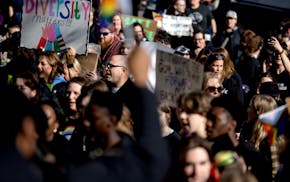Perhaps the most circulated slogan of Egypt's "Jan. 25" revolution of 2011 has been aish, hurriyah, adala igtimaiyya, karama insaniyya (i.e., bread, freedom, social justice, human dignity).
It offers a critical reading of the revolution's primary trajectories, and best captures Egypt under President Hosni Mubarak's 30-year rule. The revolution galvanized mass support from Egyptians who poured into the public arena to demand regime change. In response, the Supreme Council of the Armed Forces (SCAF) ousted Mubarak and assumed power for an interim period that ended with the election of Mohammed Morsi on June 30, 2012, as Egypt's first Islamist president.
That election signaled a promising transition from a 60-year-old military control to a democracy-based civilian leadership. The transition of power process, however, proved to be a tough terrain. On July 3, 2013, the SCAF deposed Morsi in response to mass protests organized by the Tamarod (rebellion) grass-roots movement, despite an outcry by the Muslim Brotherhood's supporters over a perceived military coup. Adly Mansour, chief justice of the Supreme Constitutional Court (SCC), was named acting president as part of a transitional plan toward new parliamentary and presidential elections.
This move comes as a consequence of a strenuous display of mistrust between the SCAF and Morsi, which culminated in a series of constitutional declarations, SCC legal battles, shifting coalitions, and mass demonstrations. At the core of those confrontations lay a heavy emphasis on reducing democracy to procedural technicalities and ballot votes combined with disregard for issues of dialogue, inclusion and unity. The result has been a polarized society lacking a solid national identity.
In March 2011, a referendum on the SCAF's amendments to the Egyptian constitution received 77 percent approval as part of a transitional plan for a parliamentary election to be followed by a presidential election and the drafting of another constitution. The parliamentary elections to the People's Assembly concluded in January 2012, with Islamists dominating with nearly 71.5 percent. On June 14, 2012, the SCC ruled the newly elected People's Assembly unconstitutional due to violations of the conditions regulating parliamentary independent seats. Islamists read the ruling as an attempt by the remnants of the Mubarak regime to circumvent democracy. Three days later, the SCAF issued a constitutional addendum to guarantee certain legislative oversight while limiting presidential executive power until the drafting of a new constitution.
Despite Morsi's failure to reinstate the People's Assembly, he managed to consolidate his executive power by annulling the SCAF's constitutional addendum and replacing SCAF's head with the newly appointed defense minister, Col. Gen. Abdul Fattah el-Sisi. On Nov. 22, 2012, he further issued a constitutional declaration that granted his decrees full executive and judicial authority until a new constitution was ratified and a new parliament elected. This move agitated opposition groups, which formed into the National Salvation Front (NSF) coalition. After mounting pressure from the NSF, Morsi rescinded certain judicial powers but rushed a new constitutional draft approved by a heavily influenced Islamist constituent assembly and boycotted by its liberal and secular members. He called for a referendum on the new constitution, which passed with 63.8 percent approval with only 32.9 percent voter turnout.
Morsi's measures could be read as reactionary to hurdles and demands imposed by the SCAF, SCC and NSF. They were, however, indicative of an Islamist orientation to governing that disregarded the complexity of Egypt's sociopolitical system. This orientation would soon be echoed through his controversial appointees and in his inflammatory statements; even more so in the emerging dogmatic media and his supporting rallies. The overall impression, particularly in the first half of 2013, was of an administration more invested in defining the country's national identity (Islamist) than in addressing the inherited deteriorating economy, which was deeply hurt by the disruption of tourism and a sweeping energy and fuel crisis.
El-Sisi assured Egyptians that ousting Morsi contributes to the society's welfare. Still, the polarization continues now that the military's claim of power, though mediated through the SCC, accompanies arrests, detentions and the shutting down of Islamist media — serving as a reminder of a repressive Nasserite era in which the Brotherhood experienced ugly forms of systemic prosecution. The tensions have led to a number of bloody confrontations, the worst of which claimed the lives of more than 50 Brotherhood supporters while injuring hundreds.
Egypt's extremely volatile situation requires an immediate process of reconciliation and healing. The new transition plan cannot afford to exclude the Muslim Brotherhood from the political spectrum if Egypt's decisionmakers aspire to respect the spirit of the "Jan. 25" revolution and ensure the country's long-term stability.
Waleed F. Mahdi is a doctoral candidate in American studies at the University of Minnesota and is a student of development studies and social change at the university's Interdisciplinary Center for the Study of Global Change.
Store guns safely and save lives

Why we protested at the University of Minnesota


